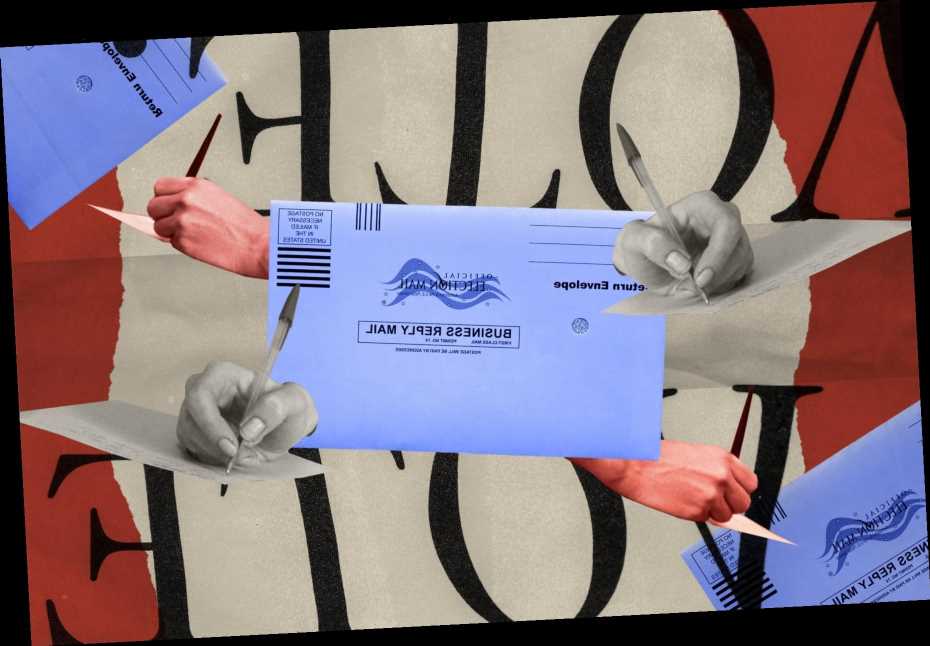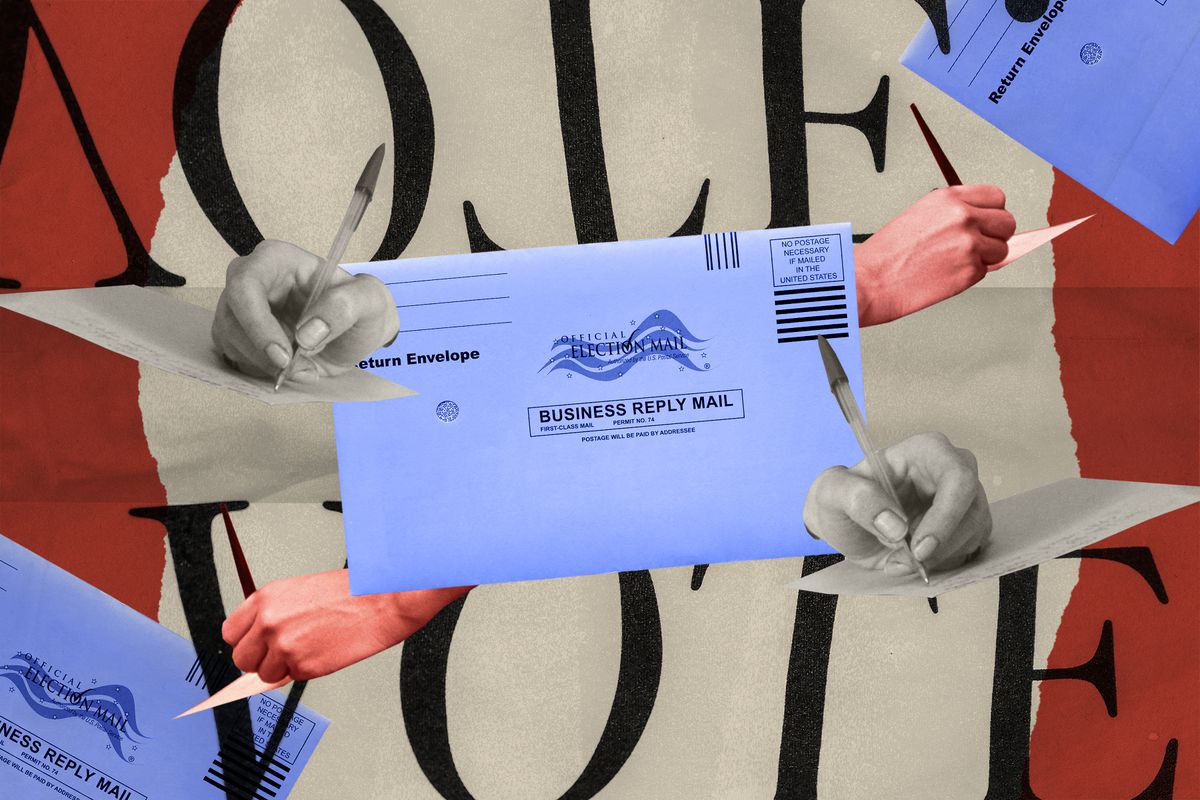"Rage, Election Worries and Covid-19 Fears Plague Americans" — this is the ominous subject line of an email that landed in my inbox earlier this month. Unsurprisingly, the new survey in question found that more than half of Americans (58%) are worried about the 2020 election. This echoes findings released back in January from the American Psychological Association (APA) that reported 56% of U.S. adults considered the presidential election to be a "significant source of stress."
And this 'election stress' it's only going to become more ubiquitous, and more intense, the closer we get to November 3, psychiatrist and Time's Up Healthcare founding member Jessi Gold, M.D., Assistant Professor, Department of Psychiatry, Washington University in St Louis, tells me.
“Election stress has been a common theme among my patients and colleagues,” agrees Nina Vasan, M.D., Clinical Assistant Professor of Psychiatry at Stanford University School of Medicine and Chief Medical Officer of Real, a new on-demand personalized therapy platform. This anxiety stems from being forced to sit with so much uncertainty about how the election will play out, she says, and is exacerbated by the baseline worry many of us are living with as a result of the pandemic, ongoing police brutality, and the fact that the world is literally on fire around us.
In other words, we're "very emotionally raw right now," Dr. Gold says. "People are on a tenuous emotional footing to begin with… now they're wondering… can I tolerate an election result that isn’t how I’d like it to go? That is the key to everyone’s anxiety and concern: Existential dread about what November brings," she adds.
“People are on tenuous emotional footing to begin with… now they’re wondering… can I tolerate an election result that isn’t how I’d like it to go? That is the key to everyone’s anxiety and concern: Existential dread about what November brings.”
It should come as no shock that, according to Dr. Gold, progressive women and healthcare workers are dealing with election stress the most. (This may be skewed, she adds, since she works largely with the typically liberal-leaning college population, plus women are more likely to seek therapy in general than men.) It's these women who feel like they have everything to lose — including control over their own bodies — if Trump wins the election. "That group is particularly worried they’ll feel the same way they did in 2016 — but worse, given how the past four years have felt for them, and the past six months," Dr. Gold says.
“As a physician, I found it heartbreaking to see that the 2016 election became a traumatic event," Dr. Vasan recalls of her experience four years ago. "In particular, women who had a history of sexual assault were triggered by the President’s behaviors and statements. I had patients who had never discussed this part of their history before, and struggled as his actions brought to the surface long-standing pain,” says Dr. Vasan.
Interestingly, Dr. Gold adds that working in a red state, she has also seen election stress (albeit, with drastically different concerns) from Trump supporters, and Dr. Vasan agrees it's happening along both party lines. “People in both parties are deeply passionate about their side of critical issues" — like the economy, climate change, and COVID response, to name a few — "and they are worried about what this election means for their families, livelihood, and future.”
And let it be known: Therapists are worried, too. In what Dr. Gold describes as a situation therapists have "never seen before", their calendars are already booking up for November as people anticipate needing more support pre- and post-election. Mental health professionals, humans themselves as we sometimes forget, are now concerned about how they'll conserve their energy to meet the overwhelming demand, Dr. Gold says. “As someone who did therapy after the 2016 election, it’s horrible. Every visit is the same.”
The bad news is, election stress isn’t going anywhere. In fact, it will probably only intensify in the coming weeks as we begin the 2020 debate cycle at the end of the month and election polls take over our news feeds. Prioritizing your self-care, however, will be more important than ever.
Here, a few ways to cope with election stress.
Get involved.
One of the best ways to cope with election stress in a healthy way is to get involved and make your voice heard, Dr. Vasan says. “Identify a simple action you can take that helps you feel in control of what’s going on, such as sending a letter to your congressperson about a bill you care about, signing a petition, donating to a candidate or cause you support, or helping register people to vote,” she suggests. “It’s helpful to feel engaged in the world and that you’re fulfilling your civic responsibility.”
“It’s easy to get disillusioned, but voting is not only important in making sure your voice is heard, but also beneficial to your mental wellbeing.”
Make a plan to vote.
If you haven't already registered and made a game plan for how you will safely vote during the pandemic, know that it's a key step to managing election stress. “It’s easy to get disillusioned, but voting is not only important in making sure your voice is heard, but also beneficial to your mental wellbeing,” says Dr. Vasan.
Limit your time consuming the news.
“There are unlimited stories, videos, and blogs about the election, with new content coming out seemingly every minute. Draw some boundaries for yourself around how much (e.g. no more than 30 minutes) and what type of media you engage with,” Dr. Vasay says.
While we need to stay tuned in, Dr. Gold suggests unfollowing and unsubscribing as much as you can, as well as removing push notifications from your phone. Instead, choose just a few outlets to follow on your own time — preferably during clearly defined daytime hours. “Limit time before bed with the news if you can. In the hour before bed, do something relaxing for your own self-care — don’t scroll,” she says. Establishing these healthy habits now is key: “As we get closer to the election, polls and results can be really anxiety-provoking and can mess with your sleep. The more we’re sitting on social media and reading the news at night, the worst we’ll feel.”
Limit your engagement on social media.
As with the amount of time you spend reading the news, Dr. Vasan recommends limiting your time on social media to 20 minutes at a time, max. “Avoid getting into the black hole of back and forth arguing with others on the social media platforms," she suggests, and simply unfollow the people on social whose accounts are triggering your election anxiety.
Be mindful of your IRL conversations, too.
“We’re in a very divided time and it’s really hard to have conversations [with those you disagree with] without feeling worse,” Dr. Gold says. “You don’t need to cut people out permanently, but limit or avoid talking about the election with people who will add to your stress." Dr. Vasan suggests stopping conversations about the election after 10 or 20 minutes, especially if it’s not constructive.
Consider a political-free zone at home.
If you’re one of the many millennials or Gen Zers who have found themselves living with their parents during the pandemic, there’s a good chance the election is a regular dinner table conversation. But if you're constantly engaging in heated arguments that go nowhere, and you know there's no way you're changing their vote, it can take a toll on your own mental wellbeing, Dr. Gold says.
“It’s OK if you don’t reprimand your dad for everything he says that is racist. At a certain point, you have to say, this has to be a safe place for me to live and be able to relax,” Dr. Gold says. "It might be against your values to not say something, but you don’t need to engage every time. You can pick your battles and protect yourself a little bit.”
Consider starting therapy.
“It’s sometimes hard to get started when you don’t have a specific topic on your mind, so this can be a great entry point to working through bigger things,” Dr. Vasan says.
Real offers an intimate Group Salon on hard conversations with family, for those who are having trouble connecting with family members on the other side of the aisle, as well as a therapist-led event on election anxiety. You can also check out this list of free and low-cost therapy resources for people of color.
Source: Read Full Article

